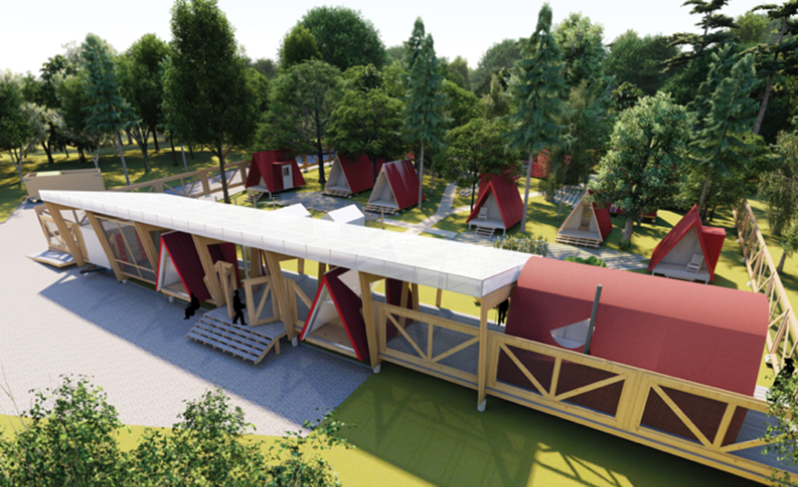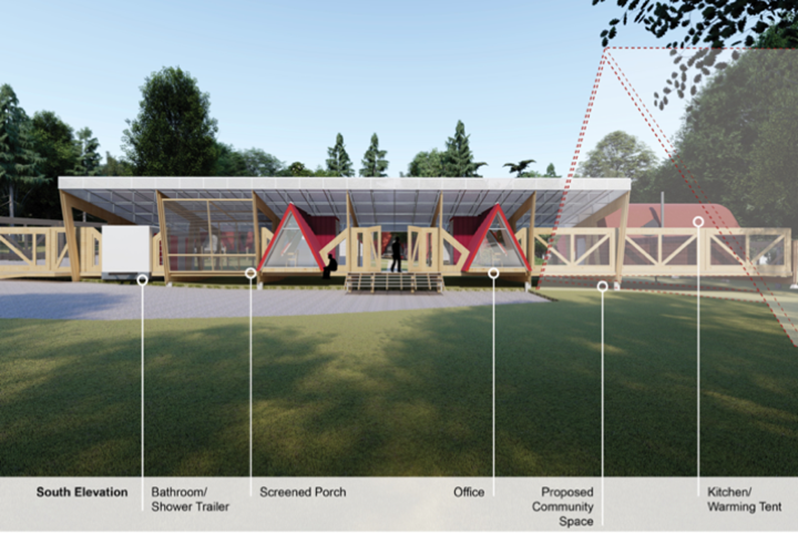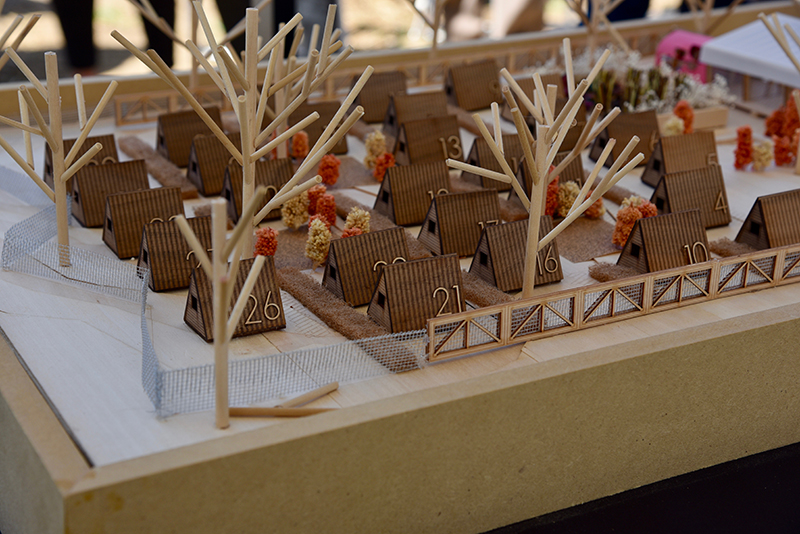
A communitywide effort, led in part by University of Arkansas faculty, is helping to address an issue that impacts thousands of Arkansans annually: homelessness.
The project, called "New Beginnings," is a bridge housing community. The effort is designed to be a self-managed community of low-cost housing for people experiencing chronic homelessness.
The initiative is led by Serve Northwest Arkansas, a nonprofit composed of community members dedicated to helping the Northwest Arkansas community through tangible acts of service.
New Beginnings is located on 4.7 acres of land on South 19th Street in Fayetteville, near 7Hills Homeless Center.
 Kevin Fitzpatrick, University Professor and the Jones Chair in Community in the Department of Sociology and Criminology, addresses supporters at the April 12 groundbreaking for the project. |
 Another rendering by the Community Design Center shows various components of the New Beginnings project, which organizers hope to have finished by October. |
 A model of the site gives a sense of density and organization of the site. |
Finding ways the University of Arkansas can serve the community has long been a priority for Kevin Fitzpatrick, who serves on the board of Serve NWA.
As a University Professor and the Jones Chair in Community in the Department of Sociology and Criminology, Fitzpatrick is keenly aware of the many problems that gnaw at Northwest Arkansas but often go unnoticed — in particular the growing homelessness crisis.
The housing at New Beginnings is not meant to be permanent for residents, but is instead designed to provide a critical step toward full-time housing for people who have been chronically homeless and lack the skills and support to move forward.
"It's a catalyst for different thinking," Fitzpatrick said. "It's not, 'Let's respond by building a typical shelter or get them into an apartment.' What we're doing is responding to a problem that plagues a particular subgroup of the homeless population who need folks working on solutions to get them out of their unsheltered circumstances."
For people who have experienced chronic homelessness, moving directly into a home is not always a viable option.
"It's typically not out of the woods and into an apartment," Fitzpatrick said. "It's out of the woods and onto a pathway. We want that to be your end point, but it's probably not your starting point. We want to get people out of the woods and into a safe, secure, stable, clean environment to decompress and begin working on and thinking about a new lifestyle. It's not a snap-your-fingers kind of process. It's slow, with lots of bumps, traps, failures. But we're committed to this strategy for a really hard-to-address problem."
Individuals who have been homeless for an extended period of time often require additional resources beyond simply housing or financial support, Fitzpatrick said. Mental health issues, addiction and other medical problems are common among this population.
"They tend to be more complicated because of the complexity of what they bring to the table," he said.
As the project progresses, opportunities for different sectors of the university to participate will continue to grow, Fitzpatrick said.
"Moving forward, there are potential partnerships for agricultural, nursing, social work. You name it, we will have opportunities," he said. "Plus, there's will be the opportunity for just volunteering."
The project not only addresses an important community need — it also gives U of A students a chance to put to work what they're learning in the classroom.
"This is what we hear about life-changing results with medical schools that have street outreach programs that require residents or interns to do a month of rotation in that kind of setting," Fitzpatrick said. "I'm hoping at some point we get to a point where [the University of Arkansas for Medical Sciences] can offer that as a way of engaging students with our clients."
Fitzpatrick said students enter his classes with a general awareness about homelessness, but they have little experience beyond that.
In addition to bringing together community partners, the project has been a catalyst for collaboration at the university. Faculty and students from the Department of Sociology, Department of Mechanical Engineering and the Fay Jones School of Architecture and Design have all played a role in the project.
"We want to be able to garner all the resources that a university like this has to address both the problems and the needs of a population, while at the same time giving students a unique opportunity to engage with a set of problems and a population that isn't part of the typical curriculum," Fitzpatrick said.
The University of Arkansas Community Design Center, an outreach program of the Fay Jones School, provided design work for the site.
For Steve Luoni, director and principal designer at the center, the project was a chance to approach community building from a new perspective. Luoni is also a Distinguished Professor and the Steven L. Anderson Chair in Architecture and Urban Studies in the Fay Jones School.
"Since our mission is to promote creative development that enhances place in Arkansas through combined education, research and design solutions, New Beginnings challenged us to develop a different kind of neighborhood offering more than just shelter," Luoni said. "While we have extensive experience with all sectors of housing, including design of affordable housing, New Beginnings represents a housing solution based on cooperative forms of living that assists residents in re-establishing stability about their lives.
"Akin to a 'tiny home' community, New Beginnings triangulates shelter with wraparound social services and a self-governing community towards building greater independence," Luoni continued. "It's a neighborhood or camp for developing deep social capital far beyond what emergency shelters can offer."
In the College of Engineering, students in professor Ajay Malshe's undergraduate course in Introduction to Materials Science and Engineering studied the project and provided recommendations for everything from flooring to roof construction to indoor and outdoor flooring. Teams developed their recommendations based on their study of materials structure and design, properties, processing and manufacturing and applications.
About 70 undergraduate students participated in the project, and Malshe, a Distinguished Professor of Mechanical Engineering and 21st Century Endowed Chair Professor, said it was an immersive learning experience designed for students to experience the real impact engineers can make in communities to improve the quality of life — particularly for marginalized groups.
"My goal as an instructor is, first, to bring this issue onto their radar," Malshe said. "Second, it's to make sure there is a formal vehicle for them to learn and take action. Teaming with Kevin was a great experience. He is highly motivating and a dedicated colleague for the cause, and I look forward to more cross-campus and cross-community projects for student learning, which will also be to the benefit of all Arkansans."
Malshe said he's found that today's students are increasingly interested in the societal impact of their work, locally and globally, and the best way to drive engagement is to have students experience how their work affects others by involving them in the local community.
It's a lesson Malshe said will serve students well in retaining knowledge, as well as in making a difference for fellow citizens through servant leadership.
"If you're going to solve a real engineering problem, you can't solve it in a cubicle," Malshe said. "You've got to immerse yourself in that environment mentally and physically."
Fitzpatrick said the project is also a prime example of how the university can work with local government leaders to make an impact at home.
"It's just a good relational connectedness between town and gown," Fitzpatrick said. "We're looking at ways to try to connect those two pieces through a project like this. The pieces don't fit perfectly, you've got to push some corners together. But the goal should be, 'What can we do?' And through my position as the endowed Jones Chair in Community, I am always asking: 'What can I do with the resources I have access to at the university to improve the lives of people in and around the university?' I've always looked at that as my responsibility. I've been driven by that goal for this project."
New Beginnings broke ground April 12 in south Fayetteville with support from the University of Arkansas, the city of Fayetteville, the Fayetteville Chamber of Commerce and a variety of other community partners.
Construction is expected to begin in May. Plans call for the community to be accepting residents in the early fall and be operational before the winter of 2019-20.
For more information, visit the New Beginnings bridge housing community online.
Topics
Contacts
Nick DeMoss, director of communications
College of Engineering
479-575-5697,